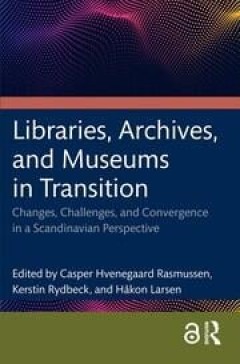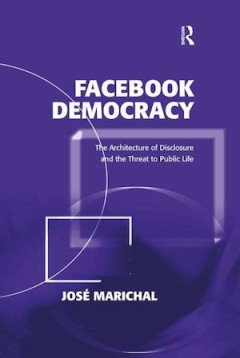Filter by

Libraries, Archives, and Museums in Transition : Changes, Challenges, and Con…
In this anthology, top scholars researching libraries, archives, and museums (LAM) issues in Scandinavia explore pressing issues for contemporary LAMs. In recent decades, relations between libraries, archives, and museums have changed rapidly: collections have been digitized; books, documents, and objects have been mixed in new ways; and LAMs have picked up new tasks in response to external …
- Edition
- -
- ISBN/ISSN
- 9781003188834
- Collation
- -
- Series Title
- -
- Call Number
- -

Security in Computer and Information Sciences
This open access book constitutes the thoroughly refereed proceedings of the Second International Symposium on Computer and Information Sciences, EuroCybersec 2021, held in Nice, France, in October 2021.
- Edition
- 1
- ISBN/ISSN
- 978-3-031-09357-9
- Collation
- -
- Series Title
- Communications in Computer and Information Science
- Call Number
- XI, 133

Cyber security politics :socio-technological transformations and political fr…
- Edition
- -
- ISBN/ISSN
- 9781003110224
- Collation
- -
- Series Title
- -
- Call Number
- -
- Edition
- -
- ISBN/ISSN
- 9781003110224
- Collation
- -
- Series Title
- -
- Call Number
- -

Agile Processes in Software Engineering and Extreme Programming
This open access book constitutes the proceedings of the 23rd International Conference on Agile Software Development, XP 2022, which was held in Copenhagen, Denmark, in June 2022. XP is the premier agile software development conference combining research and practice. It is a unique forum where agile researchers, practitioners, thought leaders, coaches, and trainers get together to present a…
- Edition
- 1
- ISBN/ISSN
- 978-3-031-08169-9
- Collation
- -
- Series Title
- Lecture Notes in Business Information Processing
- Call Number
- X, 237

Spatial Similarity Relations in Multi-scale Map Spaces
How does one determine how similar two maps are? This book aims at the theory of spatial similarity relations and its application in automated map generalization, including the definitions, classification and features of spatial similarity relations. Included also are calculation models of spatial similarity relations between arbitrary individual objects and between arbitrary object groups, and…
- Edition
- -
- ISBN/ISSN
- 978-3-319-09743-5
- Collation
- -
- Series Title
- -
- Call Number
- -

Becoming-Social in a Networked Age
This book examines the semiotic effects of protocols and algorithms at work in popular social media systems, bridging philosophical conversations in human-computer interaction (HCI) and information systems (IS) design with contemporary work in critical media, technology and software studies. Where most research into social media is sociological in scope, Neal Thomas shows how the underlying mat…
- Edition
- -
- ISBN/ISSN
- 9781315195629
- Collation
- -
- Series Title
- -
- Call Number
- -

Intelligent Computing for Cultural Heritage: Global Achievements and China's …
This book offers a global perspective on the latest advancements and trends in digital humanities and intelligent computing of cultural heritage, covering both academic research and case studies within cultural institutions. This edited volume brings together views and practices from different regions, including Asia, Europe, Africa, North America, and Australia. It offers innovative approache…
- Edition
- -
- ISBN/ISSN
- 9781032707211
- Collation
- -
- Series Title
- -
- Call Number
- -

Facebook Democracy : The Architecture of Disclosure and the Threat to Public …
Drawing on a number of disciplines and an ethnographic analysis of 250 Facebook political groups, Marichal explores how Facebook's emphasis on social connection impacts key dimensions of political participation: e.g. mobilization, deliberation, and attitude formation.
- Edition
- -
- ISBN/ISSN
- 9781315581798
- Collation
- -
- Series Title
- -
- Call Number
- 650

Digital Synergy
In an era where technological progress redefines the boundaries of business and management, ‘Digital Synergy - Innovative Management in the ICT Era’ emerges as a guide for current and aspiring leaders. This book delves into the heart of modern management practices, illuminated by the transformative power of Information and Communication Technologies (ICT) and digital synergy. Facing the rel…
- Edition
- -
- ISBN/ISSN
- 9781003440406
- Collation
- -
- Series Title
- -
- Call Number
- -

State-sponsored disinformation around the globe: how politicians deceive thei…
Introduction : deceiving from the top : state-sponsored disinformation as a contemporary global phenomenon / Martin Echeverría and Sara García Santamaría -- Theoretical understanding of state-sponsored disinformation / Petros Iosifidis -- Rethinking disinformation for the global South : towards a particular research agenda / Grisel Salazar Rebolledo -- Statistics and state-sponsored disin…
- Edition
- -
- ISBN/ISSN
- 9781032632940
- Collation
- -
- Series Title
- -
- Call Number
- -
 Computer Science, Information & General Works
Computer Science, Information & General Works  Philosophy & Psychology
Philosophy & Psychology  Religion
Religion  Social Sciences
Social Sciences  Language
Language  Pure Science
Pure Science  Applied Sciences
Applied Sciences  Art & Recreation
Art & Recreation  Literature
Literature  History & Geography
History & Geography